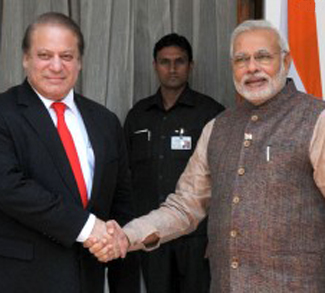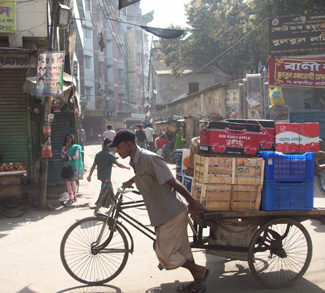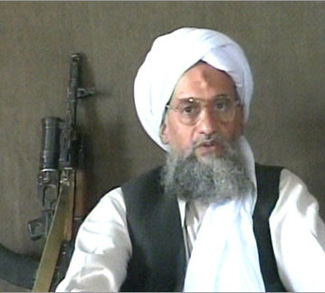In a welcome step, the chiefs of the Indian Border Security Force and its counterpart, the Pakistan Rangers, met in New Delhi over three days and the talks have been productive. This comes after the calling off of NSA-level talks between India and Pakistan, which had originally been agreed to by the Indian and Pakistani prime ministers on the sidelines of the SCO (Shanghai Cooperation Organisation) summit in Ufa earlier in July, when they agreed to revive the dialogue process which had stuttered to a halt. During the Ufa meeting, PM Modi also accepted Pakistani PM Nawaz Sharif’s invitation to visit Pakistan next year for the SAARC (South Asian Association for Regional Cooperation) summit.
India-Pakistan Relations Since Modi Took Over
The recent downturn in India-Pakistan relations contrasts sharply with the positive momentum when PM Nawaz Sharif attended the inauguration of PM Modi in May of last year, disregarding the opinion of many hardliners within Pakistan. However, soon thereafter, relations went into a dive with Foreign Secretary-level talks between India and Pakistan being called off in August last year after the Indian government objected to the Pakistani High Commissioner’s meeting with Kashmiri separatists in India.
What Led to the Calling Off of Talks?
Though the joint statement read out by the foreign secretaries of the two countries in Ufa on July 10 seemed like a breakthrough, since then a series of terrorist attacks have taken place in the Indian states of Jammu and Kashmir and Punjab, which share borders with Pakistan. The terrorist attack in Gurdaspur in Punjab (which borders Pakistan) in late July is very significant since this could mean the beginning of a new wave of terror in Punjab, which had not seen such attacks for eight years now. It is worthwhile to mention here that Punjab witnessed a long bout of terrorism in the 1980s (which continued until the early 1990s). In a significant development, a Pakistani national, Mohammed Naved, was arrested in Jammu and Kashmir following an attack on a BSF (Border Security Force) convoy on the Jammu-Srinagar National Highway. In addition, both India and Pakistan have accused each other of ceasefire violations and many civilians have been killed on both sides of the border since the Ufa meeting.
The trigger for calling off NSA-level talks was insistence by Pakistani NSA Sartaz Aziz that he would be meeting Kashmiri separatist (Hurriyat) leaders in New Delhi, to which India objected, and India’s insistence that the talks should focus on terrorism. Some separatist leaders were detained in New Delhi where they had come in anticipation of the meeting with the Pakistani NSA. Since it was the Pakistani NSA who was to come to India for the talks, a Pakistani statement noted that “the scheduled NSA level talks cannot be held on the basis of the preconditions set by India.”
However there is much more to the calling off of the talks than meets the eye. In the joint statement in Ufa, there was no mention of Kashmir and this was not taken lightly by the military establishment and many other sections in Pakistan, which saw this as a sell-out. India has always avoided engaging the Pakistani Army, unlike many other countries, something which has always irked the military establishment in that country.
The Indian government was also under pressure as the BJP-led NDA government had promised to take a tough line on terrorism emanating from Pakistan and, while in the opposition, had vociferously criticized the earlier Congress-led government of Dr Manmohan Singh saying that it was soft on terror. Though the joint statement in Ufa mentions that “both leaders condemned terrorism in all its forms and agreed to cooperate with each other to eliminate this menace from South Asia,” India has also been unhappy with the tardy pace of progress in prosecuting the key masterminds of the Mumbai terrorist attacks of November 2008 by Pakistan.
What Lies Ahead?
It is not yet immediately clear whether the two prime ministers will be meeting on the sidelines of the United Nations Sustainable Development Summit later this month in New York, even though both of them will be there. This time there is a possibility that PM Modi may not be addressing the UNGA (United Nations General Assembly) and it may be left to India’s foreign minister, Sushma Swaraj.
The aborted NSA-level talks do however mean that New Delhi should be worried about and prepared for a spike in terror-related incidents, as the Pakistan-backed terrorists would be desperate to stage a show of strength in the light of what they term as New Delhi’s “intransigence.”
Hence, New Delhi would now require some very nimble diplomatic footwork as it has no other options than dealing with Pakistan. Islamabad retains a huge amount of influence in Afghanistan and New Delhi should factor that in its calculations as well. There was an attack on the Indian consulate in Herat in western Afghanistan in May last year just before PM Modi was about to take office in India. However, for Pakistan too, the options are limited as its relations with countries like the United States have nosedived in recent times. Its principal backer now is China, which also has concerns regarding Pakistan sheltering militants who operate in China’s restive Xinjiang region. For both India and Pakistan, the dictum that “we can choose our friends, but not our neighbours” holds true and hence there is no alternative to dialogue.
The opinions, beliefs, and viewpoints expressed by the authors are theirs alone and don’t reflect any official position of Geopoliticalmonitor.com.




